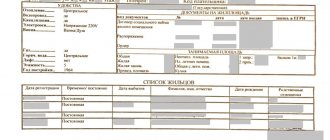Discharging a child from an apartment is not an easy question. There are a number of situations related to the removal of a child from registration at the place of residence. They depend on:
- age of the child (up to 14 years or from 14 to 18 years);
- having a share of ownership in housing;
- permission/disagreement of guardianship (for orphans or without parental care);
- consent/objection of the second parent;
- the presence or absence of new housing and its characteristics, etc.
Unlike an adult (see discharge of an adult), it is almost impossible to discharge a minor to “nowhere”. Without information about new housing, the MFC specialist will refuse to issue permission for discharge. Except in some cases.
Is it possible to expel a minor child from an apartment?
The question of whether the owner, if there are good reasons, can discharge a person who has not reached the age of majority, and if so, how, interests many people. Unfortunately, there is no clear answer to this; it all depends on the grounds for the emergence of housing rights and on a number of other related circumstances.
From the municipal
If the person being discharged or his parents do not own any other housing, the guardianship authority will refuse, since the minor did not exercise the legal right to participate in privatization, after which part of the living space would be at his disposal.
From privatized
Extracting from private property is also not an easy procedure. For example, if on the day of privatization a minor was already registered there, but his legal representative decided not to include the child in privatization, the latter is given the right to live in the apartment for life.
Legislative norms for registering children.
It is difficult to discharge a minor because the state pays special attention to respecting the rights of children.
After all, they cannot stand up for themselves. And laws protect civil rights with special care. Children must be registered where their parents live.
A child cannot be without registration. These standards follow from law number 5242-1.
It describes the rules in accordance with which citizens move around the country. Guardianship carefully monitors whether the child belongs to a certain subject of our state.
That is why, when a person becomes the owner of a home in which the previous owners with children are registered, you do not have the right to sign out one child.
This happens because the parents have no other registration. It turns out that to discharge the child anywhere .
But there are some features, knowing which you can easily understand how to discharge a minor from a house or apartment.
Is it possible to discharge a child to nowhere?
According to the current legislation, citizens can be discharged “to nowhere” only upon reaching the age of 18, but if he is the owner of this living space, then sometimes, in the event of its sale, a minor can be deregistered “to nowhere.” And then only with the permission of the guardianship authority and on the condition that the proceeds from the transaction will be credited to the child’s personal account and subsequently spent specifically on housing. In practice, consent to such manipulations is given very rarely.
What documents will be needed?
Before contacting government agencies regarding the discharge of your baby, you should prepare the necessary papers. For the guardianship authority you will need:
- information about living conditions in the old and new house;
- baby's birth certificate;
- statement;
- written consent of the minor (in some cases).
For the migration service, in addition to these documents, you need to prepare a decision from the guardianship authority and an extract from the house register. Additional information may be required.
What is needed to discharge a child? Do I need to go to court?
If there is a need for discharge, and parents or legal representatives do not object, you need to obtain permission for this procedure from the guardianship and trusteeship authorities, and then contact the territorial department of the Department of Internal Affairs of the Ministry of Internal Affairs of the Russian Federation and write a corresponding application.
If the registered representatives consider the owner’s demand to be unfounded and do not agree to voluntarily deregister with the child, then, with the support of a qualified lawyer, you must defend your legitimate interests in court.
If the child is the owner
It happens that children under 14 years of age are given deeds of gift or documents when purchasing an apartment, that is, in fact, he is the owner of all or part of the living space. In this case, the discharge procedure is special and has many nuances. If it is discovered that the owner of the purchased apartment was a minor, the new owner should proceed as follows:
- Contact the passport office and request an extract from the place of residence, as well as provide the child’s birth certificate and confirmation that he or she owns real estate.
- After a couple of days, you will be able to receive all the necessary documents.
- Next, you should contact the guardianship authorities, where, among other things, you should provide technical assistance. passport and copies of passports of mother and father/representatives of the minor.
- If a positive decision is received, you can go to the passport office for an extract.
A very important point! Only the former owner can check out the apartment or house; if it is a child, then this is done by the parents or representatives.
General rules and conditions for the child’s discharge
There are a number of rules that every person who decides to initiate the discharge of children should know:
- children are always registered and discharged together with one of the parents or with a legal representative, who can be, for example, grandmothers;
- before starting the procedure, you must obtain the consent of the guardianship authority (if you are denied guardianship, you can appeal this decision in court);
- when, when the parents divorce, the child remains to live with one of them, the consent of the other is required for discharge;
- compulsory procedure is possible only by court;
- after deprivation of parental rights, the child retains the property right to the residential property in which he is registered;
- The law prohibits discharging a child “to the street”; deregistration of minors at the place of residence is possible only with the simultaneous registration of the person being discharged in a new place, and the apartment to which he is moving must be no worse in size and level of amenities than the previous one.
Procedure
The procedure for deregistration from owned living space involves the following steps :
- Submitting an application for the discharge of a minor to the passport office or the Federal Migration Service. The application must be submitted by one of the parents or jointly. If the child is 14 years old, then he is present during the procedure; if not, the parents act independently. More information about which authorities (passport office or FMS) are currently carrying out the deregistration procedure can be found here.
- Filling out the departure form at the passport office or the Federal Migration Service (form and sample).
- Receive documents in a week.
- Registration of the child at a new address.
To obtain an extract, you must provide the parents’ passports, the child’s passport (after 14 years), the house register, and documents for the apartment.
Instructions for discharging a child from a privatized apartment
There is a certain sequence of actions, following which you can easily discharge a minor, but only on the condition that your actions do not violate the legal rights and interests of the person being discharged.
Extrajudicial procedure
The procedure for discharging a child from privatized housing will vary somewhat depending on whether the minor is the owner or is simply registered there.
The child is the owner of the apartment
First of all, you need to collect a package of documents and obtain permission from the guardianship and trusteeship authorities.
Guardianship must be provided:
- a certificate about all persons living with the child;
- proof of home ownership;
- passport from the BTI of current housing;
- passport from the BTI of the housing to which you plan to move;
- passports of mother and father;
- birth certificate of the person being discharged;
- a duly completed application.
It may take a maximum of 2 weeks for the guardianship authority to verify the authenticity of the documents and consider the application; after this time, a decision must be made.
Then you can begin the transaction of buying and selling a home. After transferring title to the buyer, the child's parent or legal representative must initiate the release.
To do this, you need to bring a corresponding application to the passport office with a package of the following documents attached to it:
- applicant's passport;
- birth certificate of the person being discharged;
- certificates from guardianship authorities;
- certificate of ownership of the apartment.
Note! If the child is under 14 years old, the parents are required to write an application on his behalf; if the minor has already received a passport, then he has the right to write an application on his own, but his legal representatives must certify it.
Deregistration with subsequent registration at a new place of residence by the Department of Internal Affairs of the Ministry of Internal Affairs will be carried out quite quickly - within 3 working days.
The child is not the owner of the apartment
This option does not require obtaining permission for discharge from the guardianship and trusteeship authorities; it is enough to simply submit the application and all the documents from the list below to the passport office.
Required package of documents:
- statement;
- passports of parents or legal representative;
- birth certificate of the person being discharged;
- departure sheet;
- passport from the BTI for new housing.
To avoid problems with the law, parents are required to register their child at their new place of residence within 7 days. You can read more about penalties for violating registration deadlines in this article.
Judicial order
If the parents do not want to be discharged with the child voluntarily and if there are sufficient grounds for forced discharge, the owner or other interested person may apply to the court to protect their interests.
To do this, it is necessary to correctly draw up a statement of claim, attach the necessary documents to it and take everything to the district court of general jurisdiction at the location of the disputed object.
One of the parents or legal representative acting on behalf of the minor should be indicated as the defendant in the application. If the child is already 14 years old at the time of the court hearing, his presence at the trial is mandatory.
Statement of claim
The statement of claim must contain the following information:
- name of the judicial authority;
- Full name and contact details of the plaintiff (address, telephone);
- Full name and contact details of the defendant (address, telephone);
- the reason why there was a need to discharge the minor;
- specific facts of violation of the property rights and interests of the plaintiff, which he can document;
- a request to the court to satisfy the requirements for the forced discharge of a minor;
- list of attached documents.
Documents required for the court:
- receipt of payment of state duty (for 2021 its amount is 300 rubles for citizens and 6,000 rubles for legal entities);
- extract from the house register;
- documents, audio and video files that can confirm the plaintiff’s words.
All cases of the discharge of minor children are considered with the participation of a third party - the prosecutor.
Deadlines
- 5 days are given to review the application and accept it for work.
- The trial will last a maximum of 2 months.
- If the court satisfies the plaintiff’s demands, the defendants will be given exactly one month to be discharged, search for an alternative place of residence and voluntarily move, after which, at the plaintiff’s request, they can be forcibly evicted by officers of the FSSP of the Russian Federation. You can read more about court-ordered eviction in our article.
Step-by-step instruction
How to discharge a baby from his mother’s apartment and register him in his father’s apartment? Or how to discharge him from his father’s apartment and register him in his mother’s apartment? What to do if the mother has kicked the child out of the apartment or the father is kicking the child out of the apartment? We'll help you figure it out.
From father to mother and from mother to father
How to discharge a baby from his father’s apartment and register him with his mother? Or how to discharge a child from his mother’s apartment and register him with his father?
The legislation allows for the discharge and subsequent re-registration of the child from one parent to another, and vice versa, without any differences.
The outcome of the procedure depends on whether the parents are legally married and whether they have reached agreement on the issue of residence of their child.
If parents are legally married and want to re-register a child from the place of residence of one parent to the place of residence of the other, they need to:
- the party that discharges the baby must submit an application for consent to his registration in a new place;
- the party who registers the child with him/herself submits an application for his/her registration;
- the guardianship and trusteeship authority, which monitors the progress of the procedure, is notified;
- the parties submit a general package of documents;
- After a certain time, parents are given a child registration certificate.
If the parents are divorced and have not come to a consensus on the question of who their baby will live with, then the parent who considers himself to be infringed on his rights goes to court with a claim to determine the child’s place of residence:
- other documents are also submitted along with the application;
- the guardianship and trusteeship authority is involved in the case, which assesses the living conditions for the child on each of the parties;
- the parties are invited to the court hearing and explain their position by way of evidence;
- Upon consideration of the case, a decision is made on the place of residence of the minor.
Instructions for discharging a minor child from a municipal apartment
The guardianship authority will allow the minor to be discharged only if two conditions are met:
- after deregistration, the child will immediately be registered at the new place of residence (one of the parents or a legal representative must be registered with him);
- the new apartment will have no worse living conditions and no less area than the previous one.
In all other respects, the procedure is almost no different from the discharge of a minor owner from a privatized apartment. Only the necessary package of documents for the guardianship authority should be supplemented with a social tenancy agreement.
Where to submit a document about removing a person from the place of registration?
The main body providing registration services to the population is the Main Directorate for Migration Issues of the Ministry of Internal Affairs of the Russian Federation (formerly the FMS).
also use the services of so-called “intermediaries”, who are responsible for receiving, transmitting and processing documents at the Main Migration Department of the Ministry of Internal Affairs of the Russian Federation. These include:
- multifunctional centers (MFC);
- portal “State Services” (how to sign up through State Services?);
- Russian consulate or embassy (this option is relevant for persons living outside of Russia).
If a citizen cannot be present at the discharge, for example, he is in another city, he needs to draw up a power of attorney for another person. There are also some nuances when deregistering in municipal housing and private houses.
Can they refuse to discharge children?
There are situations when the discharge of even a child temporarily registered in an apartment will be refused not only by the guardianship authorities, but also by the court. For example, in these:
- deregistration of a child and his subsequent registration in an apartment with worse living conditions;
- discharge of a minor “to nowhere.”
If guardianship officials “accidentally” do not monitor compliance with these rules and allow a discharge that violates the legal rights and interests of the child, any interested person can appeal the decision of the negligent employee in court.
Features and nuances
The above instructions apply when it comes to a privatized apartment. If it is necessary to discharge a child from a municipal apartment, then in order to carry out this procedure it is necessary to provide a new registration address of the parents , and if they live separately, it is necessary to provide evidence that the parent has living space.
If the apartment is not owned by the parents, but by a third party, then if consent for the mother’s registration has been received, or she is already registered at this address, then the owner’s consent for the child’s registration is not required, he is registered together with the mother automatically .
Additional nuances
Sometimes parents are interested in whether it is possible to discharge a child without the consent of the father or without the consent of the mother.
In order to change the registration address of a minor, the consent of both parents will be required if they have parental rights. It doesn't matter whether they are married or divorced.
When a parent refuses to deregister a child on a voluntary basis, the interested party will need to go to court.
But if one of the adults is deprived of parental rights or is declared missing, then all the necessary procedures for registering the child’s residential address are carried out without his participation and consent.
Arbitrage practice
Each such case involving minors is considered individually, and a decision is made after a detailed analysis of the circumstances surrounding deregistration. As an example, let's look at a case where a child was nevertheless discharged by the court, although he did not own any real estate.
Example. Taking advantage of the State Program “Young Family”, the Tsvetkovs received an apartment in an apartment building under a social tenancy agreement. But after starting to complete the paperwork, the happy family discovered that the previous tenants were still registered in this living space - a mother and her minor child, although in fact the premises had been empty for more than eight years. The internal condition of the housing was very poor - glass was missing almost everywhere, there were no interior doors, and the wiring had long since broken down.
After the former tenants were found and officially notified that new tenants were moving in, they did not agree to check out voluntarily and asked the Tsvetkovs for an impressive sum of money for refusing to register.
The latter had no choice but to go to court to discharge the former residents without the latter’s consent. The Tsvetkovs listed several facts in their statement of claim as grounds for eviction of the defendants:
- mother and child do not live at their place of registration for a long time;
- more than eight years of rent arrears have accumulated;
- Due to the fault of the previous residents, the condition of the apartment fell into disrepair.
After considering all the circumstances and evidence in the case, the claim was satisfied, and the defendants were successfully discharged by the Department of Internal Affairs of the Ministry of Internal Affairs on the basis of a court order within a few days.
Legislative regulation
Children's rights to housing, as well as norms and rules regarding their residence, are enshrined in the Constitution of the Russian Federation and the Civil Code.
In accordance with Art. 20 of the Civil Code, a child (until he reaches 14 years of age) must live in a residential area together with his parents (or one of them) or guardians. This means that it can only be registered at the registered address of its representative according to the law.
The mother and father of a minor citizen may be registered at different addresses. In this case, the child can be registered with any of them.
Important ! When registering a child for registration, the consent of other citizens registered in this living space is not required (Article 70 of the Housing Code).
General requirements
Some general points apply to all situations:
- The Main Department of Migration Affairs of the Ministry of Internal Affairs is responsible for removing people from an apartment during the sale. Previously, these functions were assigned to the Federal Migration Service, but after the merger of departments the issue passed to the Main Directorate for Migration.
- The main rule is that minors live with their parents. The procedure for registering at a new place must be taken care of in advance.
- If there is no urgent need for urgent discharge, then residents can be discharged automatically upon placement in a new apartment. The solution is not suitable if your buyer insists on transferring the completely vacated area before the transaction is submitted for registration.
- The parent or guardian is tasked with the procedure. Other relatives, even those who live in the same apartment, will not be suitable.
- The divorced parent needs to take the written consent of the other. You will be reminded about this at the passport office.
- In some regions, it is possible to discharge a minor child from an apartment when selling through the State Services portal.
- The consent of guardianship employees is not always required.









